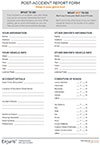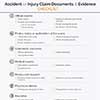Steps to take after a severe car crash or minor fender bender when you’re not to blame
The last thing anyone expects when they get into their car is to be involved in a car accident, but they happen every day.
In the United States alone, the Department of Transportation reported more than 37,150 fatalities from car accidents as of 2017. Car accidents are the fourth preventable cause of death in this country (following heart disease, cancer and chronic lower respiratory conditions), and since nobody ever anticipates an accident, they can prove to be traumatic for both driver and victim.
To be a safe driver, you must drive defensively. This might not make a difference to people who aren’t driving carefully themselves, but it will reduce the likelihood of a car accident being your fault.
Statistics show that even the most cautious and careful motorists are likely to be involved in some sort of accident – even something as innocuous as a fender-bender – during their lifetimes. Car insurance companies actually noted that every 17.9 years, a driver is expected to file an insurance claim for a collision. Being prepared is the best defense and can save time, money and pain.
Now that you know you’re going to be in a crash of some sort, perhaps multiple, the question becomes what to do after a car accident. Here we’ll cover some aspects that are especially important when it’s not your fault.
What to do after a car accident when it’s not your fault (or even if it is)
Fleeing an accident scene is against the law in every state. The driver must remain at the scene until law enforcement arrives. Even if the driver speeds away after a crash, making it a hit-and-run, stay there and report the incident yourself.
The key is to remain calm and remember these six steps, no matter what happens. Keep a small notebook and pen in your glove compartment for these types of emergencies.
A notebook can’t lose power like a cell phone can, so don’t trust your mobile device for notes and recording memories of the accident. You can even print out this accident report for your own uses.

Sample post-accident report form to keep in your glove box - fill out at the scene or as soon as you can after a car accident
Download in PDF format
Call the police immediately
Whether the crash was a fender-bender or serious accident, call 911. The police account will become part of the record, and a police report will help speed along your insurance claim. Staying at the scene and talking to the cops will only bolster your case, especially if the car accident was not your fault.
If the car accident occurred in the middle of the road, vehicles should be moved out of the flow of traffic. Otherwise, the driver and passengers should remain in the vehicle and turn on their hazard lights until police arrive.
Do you have to call the police? Not if it’s a dent or scratch, though many states require that any accident be reported to police. If you estimate damages to be worth more than $1,000 or if there are injuries, then yes. Not sure? Better call.
Exchange relevant information
When considering what to do after a car accident that’s not your fault, know that the other driver’s insurance information is going to become imperative if you want damages like medical bills and car repair to be covered. Make sure to get this info, even if it’s a minor car accident:
- Name, address and phone number
- Insurance company contact information
- Policy number
- Driver’s license and plate number
This will streamline your insurance claim and also help your attorney, should you decide to hire a lawyer after the car accident.
Get information from any witnesses to the car accident
Far too often, witnesses are just passing by wherever a car accident occurs. Unless you get their contact information, they will disappear into the ether. Also get their immediate thoughts on what occurred. This can help support that the car accident wasn’t your fault. Write down badge numbers for officers who arrive on the scene as well as contact information for the ambulance.
Tweet this
You should not discuss the particulars of the crash with anyone except law and medical professionals. Also, make sure not to talk to the other driver (except to exchange information).
Photograph the scene
This is especially important if law enforcement does not show up, and if you’re certain the car accident was not your fault. Take photos or video on your cell phone of the cars, the environment, the weather, the accident scene, skid marks, injuries, damage to cars, license plates – whatever you think might be relevant.
This evidence checklist can be a good starting point when attempting to collect important pieces. Your insurance adjuster will likely need everything on that list, so it makes sense to start as soon as possible.

Checklist of 30 items to help you prepare for making a personal injury or accident claim
Download in PDF format
Follow up
Sometimes, if a car accident doesn’t result in injuries, law enforcement might not even respond to the scene. This means you may need to file a report on the Department of Motor Vehicles website so there is a recorded paper trail. DMV.org discusses some scenarios when you might need to submit your own report to your local Department of Motor Vehicles.
If you are experiencing pain after the crash (and even if you’re not), you should visit your primary care physician. This will ensure that the accident is tied to any injuries from the car accident and that there isn’t a gap in treatment. Use this post-accident pain journal to keep track of symptoms, medications and procedures.

Sample accident journal/diary to help you document the effect on your daily life
Download in PDF format
Contact your insurance company, even if the accident wasn’t your fault
Review your own policy before calling to make sure you know what is covered and what is not. You can work with your adjustor to make sure that the other driver’s insurance coordinates with your own; this way, damages will be covered faster and more efficiently.
What else to do after a car accident that wasn’t your fault? Contact an attorney.
If you were a victim in a car crash, even a minor one, then you should not have to pay for damages or injuries. A car crash attorney is prepared to represent you in court to recover all losses.
If you have any questions or simply feel that you need more ammunition in your corner, contact a car accident attorney now.
Read up on when you may NOT need an attorney for your accident.
See our guide Choosing a personal injury attorney.

